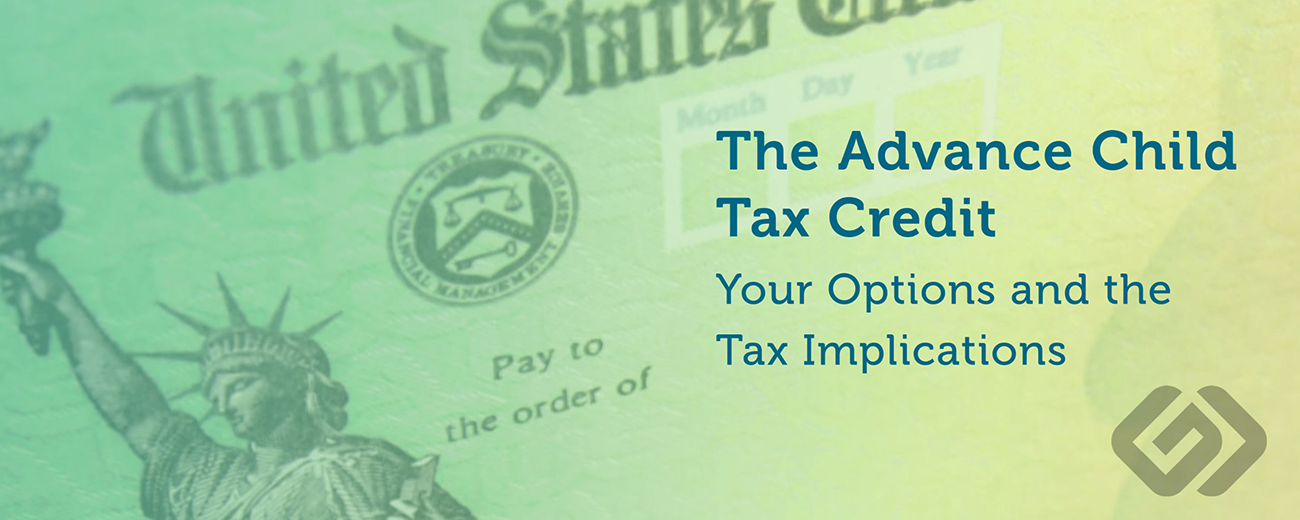The Advance Child Tax Credit — Your Options And The Tax Implications

If you are one of the millions of Americans who will receive the Advanced Child Tax Credit in a few weeks, you should also be aware of the benefits, as well as the tax implications for the 2021 tax year. As the name indicates, it is an “advance” child tax credit—meaning the payment you receive is a partial credit you would normally see on the next year’s tax return.
In accordance with the American Rescue Plan Act of 2021, the credit applies to 2021 only, for now, and is in place to assist families with debt or needs that have accumulated through the pandemic. In addition to increasing the Earned Income Tax Credit, the plan also increased the Child Tax Credit. The Child Tax Credit went from $2,000 per child to $3,000 per child for children over the age of six and $3,600 for children under the age of six. It also raised the age limit from 16 to 17. And, the entire credit is fully refundable, which means eligible families can get it even if they don’t have earned income or owe no federal income tax. Previously, the refundable portion of the credit was limited to $1,400 per child.
New Child Tax Credit – The Mechanics
Per Internal revenue code §7527A, the expanded child tax credit pays 50% of the credit early over the next 6 months with the first payments distributing on July 15, 2021. The other half will be paid out when 2021 taxes are filed. The advance payments are not subject to offsets (other taxes owed).
The anticipated credit is calculated using the taxpayer filing status, modified adjusted gross income, and number of qualifying children from the 2020 tax return, or for 2019, if 2020 is not yet filed. Children are aged to the tax year 2021. The amount can be adjusted upon filing the 2020 return if based upon 2019, or if the taxpayer provides additional information to the IRS.
For example, the amount received by a qualifying taxpayer with one child aged 6-17 would be: ($3,600 *.5 = $1,800) $1,800 / 6 payments = $300.00 monthly payments July to December 2021.
For most taxpayers, no action is needed to receive payments. If you’re eligible, payments will be electronically deposited to the account you indicated on your 2020 tax return.
Income Thresholds To Qualify Are As follows:
- Married filing jointly – $150,000
- Head of Household – $112,500
- Single – $75,000
Credit Amounts Are phased Out And Not Available When Modified Adjusted Gross Income Amounts Exceed:
- Married filing jointly = $400,000
- All other filing status = $200,000
The July Payment Opt-Out Deadline Has Passed, But It’s Not Too Late To Unenroll For August Through December Payments.
You may want to consider unenrolling if any of these scenarios apply to you.
- You qualify based on your 2020 return, but now have higher wages or earnings that do not qualify. You may have to repay some or all of the money or receive a smaller refund when you file 2021’s return, if this is the case.
- You prefer a large return as a forced saving plan for debts or high-cost household or car repairs.
- You are divorced, have joint custody, and take the tax credit in alternating years. Whichever spouse claimed the credit in 2020 will receive the credit payments. If the other spouse is supposed to receive the credit, the spouse who should not receive the credit should unenroll each month and the correctly owed spouse can claim the credit on their next tax return.
If you plan to unenroll and you are a married couple filing jointly, both spouses must unenroll by the following dates for each monthly payment date.
The IRS now has a tool available to check qualification and/or unenroll for those who do not wish to receive advance payments of the Child Tax Credit (instead addressing this issue when the 2021 tax return is filed). The tax credit update portal will allow taxpayers to update bank account information.
Taxpayers can unenroll from the payments through the IRS’s portal, but it must be done at least three days before the first Thursday of the next month by 11:59 pm, Eastern Time, or by each deadline dates below.
Unenrollment Deadlines
| Payment Month | Deadline to Unenroll | Payment Date |
| August | 8/2/2021 | 8/13/2021 |
| September | 8/30/2021 | 9/15/2021 |
| October | 10/4/2021 | 10/15/2021 |
| November | 11/1/2021 |
11/15/2021 |
| December | 11/29/2021 | 12/15/2021 |
When it comes to taxes, refunds, and planning, there’s no question too difficult. You can always check the IRS’s FAQs, but know that you can count on us to help you determine the best action for your tax needs. Get in touch with your accountant or email us at contactus@gccpas.net to start a conversation.